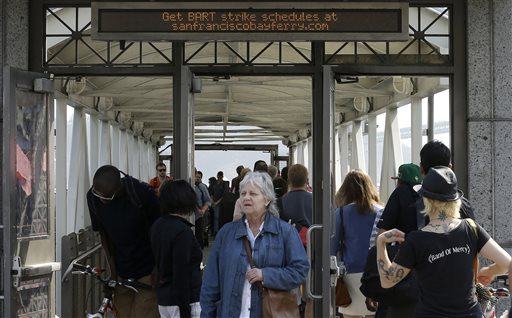(AP) Talks resume to end strike that stymied commute
By PAUL ELIAS and MIHIR ZAVERI
Associated Press
SAN FRANCISCO
As San Francisco Bay Area commuters crammed onto ferries and sat in rush hour traffic, rail workers and transit officials resumed contract talks Tuesday to end a two-day strike that has caused chaotic commutes and, according to businesses, is costing the region millions of dollars.
Political pressure is mounting for a settlement. In a letter, the state controller, lieutenant governor and insurance commissioner urged both sides to return to the bargaining table.
Evan Westrup, a spokesman for Gov. Jerry Brown, said the state was sending two of its top mediators _ the chair of the Public Employment Relations Board and the chief of the State Mediation and Conciliation Service _ to facilitate further talks.
Negotiations were scheduled to start at 6 p.m. between the Bay Area Rapid Transit agency and the two largest unions representing train workers. Calls seeking comment from the agency and unions were not immediately returned.
The letter from the Democratic state officials said the strike has caused “widespread personal hardship and severe economic disruption,” and it noted they were disappointed “about the lack of productive proposals and counterproposals in the days leading up to the strike.”
The Bay Area Council, a business-sponsored public policy advocacy organization, estimated the strike was costing the region $73 million a day in diminished productivity by workers delayed in traffic or forced into longer commutes using other forms of transit.
The figure was based on state and regional data, anecdotal evidence of commute times, and assumptions about how many people telecommute, said Rufus Jeffris, a spokesman for the group.
Stephen Levy, director of the Center for Continuing Study of the California Economy in Palo Alto, countered that the disruption might be annoying but the impact is minimal on the $600 billion a year regional economy.
Commutes in the region were thrown into chaos when the strike began early Monday after talks with management broke down.
BART is the nation’s fifth-largest rail system and carries passengers from the furthest reaches of San Francisco’s densely populated eastern suburbs to San Francisco International Airport across the bay.
Freeways have choked to a standstill. Lines for ferry service tripled, and boats were crammed to standing-room only.
Buses were stuffed with riders who felt fortunate to be on board as many commuters were literally left in the dust when buses zoomed by without as much as a honk or an explanation.
About a hundred people waited single-file at the downtown Berkeley bus station. Some had watched multiple full buses cruise by for hours.
BART, with 44 stations in four counties and 104 miles of lines, handles more than 40 percent of commuters coming from the East Bay to San Francisco, said John Goodwin, a spokesman for the Metropolitan Transportation Commission.
Transit authorities have made accommodations to help during the strike, including longer carpool lane hours and additional ferries and buses. BART doubled the number of buses serving West Oakland to 36 on Tuesday.
The striking unions and management reported being far apart on key issues including salary, pensions, health care and safety.
The unions, which represent nearly 2,400 train operators, station agents, mechanics, maintenance workers and professional staff, want a 5 percent raise each year over the next three years.
BART said union train operators and station agents average about $71,000 in base salary and $11,000 in overtime annually. The workers also pay a flat $92 monthly fee for health insurance.
___
Associated Press writers Lisa Leff and Martha Mendoza contributed to this report.

COMMENTS
Please let us know if you're having issues with commenting.